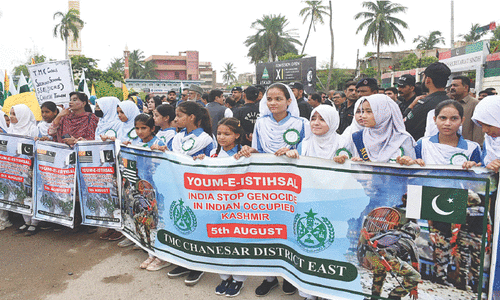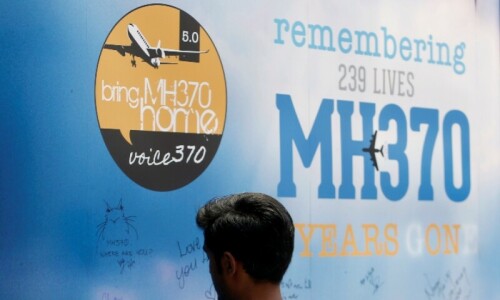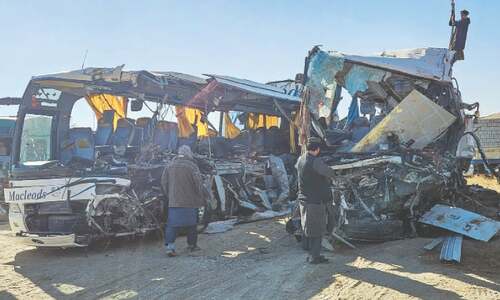FOR India’s ruling BJP, what will Aug 5 be most remembered for? It is, of course, the day that Sheikh Hasina Wajed was deposed by a mass uprising against her authoritarian government. The ousted Bangladesh premier was perhaps a rare close ally of Prime Minister Narendra Modi in a neighbourhood where India endures persistent Sino-phobic nightmares.
Or would the day be likelier remembered as the harbinger of bad news for Kashmiris, whose special rights Modi snatched on this day through a parliamentary motion in 2019? It was, coincedentally, also the day when China growled — and the sound continues to ricochet on the Himalayan borders. China was angered by India’s move to dismember Jammu and Kashmir and set up a separate entity of Ladakh, over which Beijing disputes Delhi’s claim.
Or would Aug 5 nurture memories of the hugely televised foundation ceremony of the temple in Ayodhya, by the leader of a still notionally secular country?
Whatever be the course for historical memory, the essential thread running through the landmark events is that Modi may have missed the import of all three. He claimed his move against Kashmiris would end terrorism and bring prosperity to the region, neither of which has so far come true. He thought that his highlighting of the Ayodhya temple event would win him the election. That didn’t happen and, in fact, his third term leans on the vital support of two allies who had opposed the destruction of Babri Masjid.
Missing the imminent overthrow of his close friend must be an inconsolable blow to Modi.
Missing the imminent overthrow of his close friend, who came to applaud his swearing-in on all three occasions, must be an inconsolable blow to what seems like his waning run of luck. When Sheikh Hasina came to see him twice after his third swearing-in, Modi should have been aware of the rumblings in Dhaka, where she had won the sham January election that the opposition boycotted. If she was Modi’s prop to balance China, she was a vulnerable one.
Had Modi’s intelligence squad been focused at home rather than on chasing Sikh insurgents in distant lands, he would perhaps be in a better place to advise his friend to watch out. But diplomatic misjudgements are not Modi’s monopoly, and the malaise seems to be rooted in his ideological grooming with the habitual pro-West leaning that blinded his Hindutva forebears to the delicate needs of a world in flux, which Nehru had grasped with grace and ease.
The flight of the embattled Sheikh Hasina has echoes of the fall of the Shah of Iran for India, which again brings into stark relief the ineptness of the BJP’s parochial worldview that seeks to insert itself in the nuanced world of diplomacy. Almost like Hasina’s two quick visits to Delhi in June, the Iranian monarch is remembered for his last foreign trip, for which he chose India. He was warmly hosted by a government of which the BJP, in one of its previous avatars, was a key component, and in which A.B. Vajpayee was foreign minister.
There is screaming evidence from diplomatic history of how other foreign leaders whom this or that BJP leader embraced as some kind of diplomatic trophy would fall either to an electoral defeat, a popular uprising, or an old-fashioned coup. There’s little occult in these coincidences. If anything, they are likely rooted in the choices the BJP has made, often to court or please Washington. In doing so, the BJP ends up undermining India’s tested, honed and surefooted plank of non-aligned. In its craving for Western patronage, the party — currently offering itself as a bulwark against China — has thrown aside habits that endeared India to its neighbours and the entire Global South.
In 1978, Jimmy Carter became the first Democratic US president to visit Delhi. He was followed by the Shah. Both were hosted by the Janata Party government, whose éminence grise was foreign minister Vajpayee. Carter became a one-term president, and the Shah would be pleading for sanctuary that was denied by his former allies. Lionised in Delhi, the monarch died a friendless fugitive in Cairo.
Worse, an embarrassed Indian government was soon searching for a conduit who could help Delhi find a toehold in Ayatollah Khomeini’s majlis. Vajpayee discovered a Shia cleric in Lucknow, who claimed to have the blessings of Khomeini. What transpired in Tehran was reported tongue-in-cheek in an Indian daily. Khomeini, in chaste Persian, berated the Indian cleric as a phony representative. Not only that, he commanded the cleric to translate it to the dismayed Indian delegation headed by former minister Ashok Mehta.
Of course, we all know too well of the fate that befell Donald Trump when Mr Modi travelled to Houston to campaign for the president’s second term. Now, he plans to visit Volodymyr Zelensky in Kiev, apparently to cushion the anger the bear hug in Moscow caused in Washington.
There is yet another luminary prolonging his stay in power and who has been courted for ideological reasons by Hindutva leaders. He is Israel’s Benjamin Netanyahu. Modi’s peer, PM Vajpayee, similarly invested in a completely unprepared Nawaz Sharif. Sharif was deposed soon after the Lahore summit. Vajpayee remained livid with Gen Musharraf for years. But he became the first leader to greet Musharraf when he declared himself president. That friendship led to the botched Agra summit, only to be rekindled in 2004 when Vajpayee visited Musharraf in Karachi. Vajpayee lost the next polls and Musharraf waded into political turbulence soon after.
That the BJP lacks finesse can be gleaned from the way Indira Gandhi and Vajpayee conducted their nuclear tests, one quietly, the other with unrestrained glee. Whereas Mrs Gandhi called her tests peaceful, Vajpayee shot off a confidential letter to Bill Clinton, gloating how his tests targeted China. Clinton, for better or worse, released the letter to the press. Likewise, between Sheikh Hasina and Modi, it’s difficult to say who was more clueless.
The writer is Dawn’s correspondent in Delhi.
Published in Dawn, August 6th, 2024















































Dear visitor, the comments section is undergoing an overhaul and will return soon.